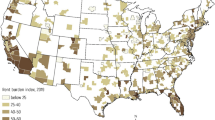Abstract
This study employed ordinary least-squares (OLS) regression to explore possible linkages between the election of L. Douglas Wilder to the governorship of the Commonwealth of Virginia and the New South phenomenon. Five selected aggregate level indicators reflective of the New South political terrain served as independent variables. The dependent variable of the analysis was the electoral support garnered by Wilder. Four of the independent variables were statistically significant (race, urbanization, income, and industrialization). However, the education variable did not achieve statistical significance. The model yielded and adjusted R2=.41. The results of our exploratory analysis suggest that the impact of the New South on the Wilder victory was limited, though crucial to his narrow victory. Thus, social and demographic change as suggested by the New South thesis, while important, do not necessarily portend African American statewide electoral success. Further systematic study of this historic contest at the individual level could shed light on political behavior among African American and white voters in the New South.
Similar content being viewed by others
About this article
Cite this article
Clemons, M.L., Jones, C.E. The wilder vote and the New South phenomenon: A multivariate analysis. Rev Black Polit Econ 25, 41–56 (1997). https://doi.org/10.1007/s12114-997-1002-4
Issue Date:
DOI: https://doi.org/10.1007/s12114-997-1002-4




